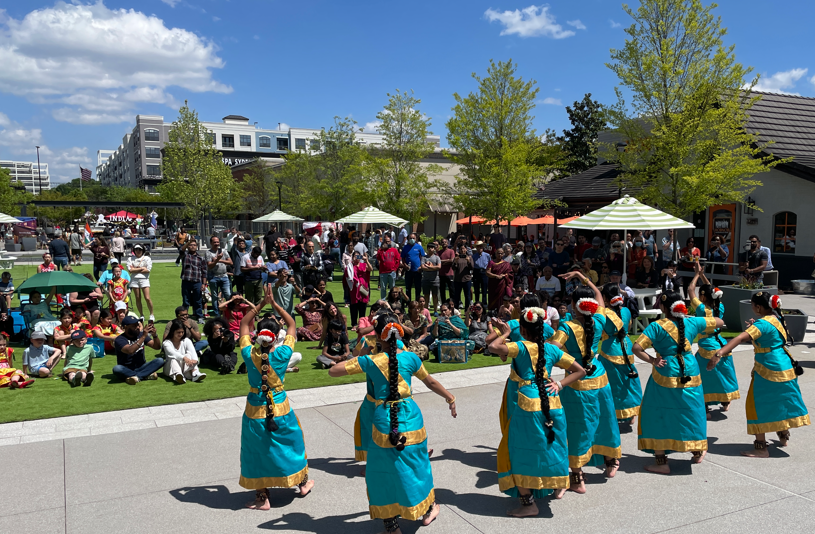Asian American & Native Hawaiian/Pacific Islander Heritage Month Guide
Photo courtesy of the City of Dunwoody taken of the annual Dunwoody AAPI Celebration.
May is Asian American & Native Hawaiian/Pacific Islander (AANHPI) Heritage Month.
AANHPI Heritage Month is not about countries in Asia. Rather, it celebrates Americans of Asian descent in the USA. The first Asians to arrive here were Filipinos in 1750 before this land became the United States!
The term “Asian American” was coined in 1968 by two activist graduate students who wanted to bring together Japanese, Chinese, and Filipinx American students with shared political goals. Before Emma Gee and Yuji Ichioka created this term, people of Asian descent were typically described by their specific ethnicity (e.g. Korean American). If people spoke broadly about people of Asian descent, the racist and colonial term “Oriental” was commonly used. In the decades since, the term, Asian American, has been taken up by the U.S. Census and other organizations.
Asian Americans are the fastest-growing racial group in the USA, including Georgia. They are diverse and rich in history. Among them are: Chinese, Filipinx, Hmong, Indian, Japanese, Korean, Laotian, Pakistani, Vietnamese, and so many more.
Did you know? Augusta, GA is the home of a thriving Chinese American community that dates back to the 1870s Augusta Canal migrant workers.
This month, we celebrate the rich history and accomplishments of AANHPI communities, and celebrate the communal strength of these diverse Americans.
AANHPI Heritage Month Engagement Guide
Kick-off AANHPI Heritage Month by listening to this blessing sung by people from over 30 churches representing 21 Asian languages.
Check out Asian American Voices for Education’s Heritage Month Kit.
Read this article by TIME about the history of the term “Asian American.”
Watch the PBS Series Asian-Americans, which has been described as “a thoughtful, compelling documentary series on the history of Asians in America.”
Learn about the importance of lament in Christian living from Soong-Chan Rah, author of many Christian books including The Next Evangelicalism: Freeing the Church from Western Cultural Captivity, Many Colors: Cultural Intelligence for a Changing Church, Prophetic Lament: A Call for Justice in Troubled Times, Return to Justice: Six Movements that Reignited Our Contemporary Evangelical Conscience, Unsettling Truths: The Ongoing, Dehumanizing Legacy of the Doctrine of Discovery, and Forgive Us: Confessions of a Compromised Faith.
On May 6, 1882, President Chester A. Arthur signed into law the Chinese Exclusion Act, the first major law restricting voluntary immigration to the U.S. Like Chinese immigrants did for generations, other hopeful immigrants to the U.S. continue to struggle against unjust laws and harmful abuse rooted in racial prejudice. Learn about the Chinese Exclusion Act.
Watch “Are You ‘AAPI‘ or ‘Asian American’? It’s Complicated” which is part of PBS’s series, A People’s History of Asian America.
Read “Bakht Singh of India,” by T.E. Koshy, which tells the story of an Indian evangelist who established indigenous local churches patterned after New Testament principles. Singh’s work helped dispel the misconception that Christianity is a Western religion and not relevant to the people of India.
Enjoy South Asian food at Chai Pani in Decatur or Ruchi Bangladeshi Cuisine in nearby Brookhaven/Chamblee.
Read Yellow by Frank H. Wu. “Wu examines affirmative action, globalization, immigration, and other controversial contemporary issues through the lens of the Asian-American experience.”
Learn about the forced relocation and internment of Japanese Americans in what President Roosevelt himself admitted were concentration camps during the second World War. Fuller Seminary MDiv student September Penn says in this video, “Take the time and [feel] what someone else has endured.”
Watch this video of the Japanese-American artist Makoto Fujimura sharing how he came to understand the beauty he creates through art by understanding and accepting the love and sacrifice of Jesus Christ.
Watch Minari, a semi-autobiographical film about a Korean-American family’s “resilience in adjusting to new cultural rules, lifestyles, and living environment” in rural Arkansas in the 1980s. Much like the parents in this film, many refugees who resettle in the Clarkston area work in the poultry industry. Consider their lived experience as our church partners with organizations that support them.
Read The Spirit Catches You and You Fall Down by Anne Fadiman, which tells the story of a Hmong refugee family and their interactions with the American healthcare system as they seek help for their baby who has a severe form of epilepsy. Pray for our church members who work in healthcare, especially those who work with refugee populations, that they may be conduits of God's love and healing to all underserved individuals and communities in their care.
Read this piece written by transracial adoptee, Tiffany Henness, about embracing one’s full ethnicity as God-given and valuable.
Eat some traditional-style barbecue with an Asian twist at the AAPI-owned restaurant Sweet Auburn Barbecue
Watch the three-part series Interconnected: Confronting Racial Prejudice between Asian American and African American communities, an AAPI Heritage Month Panel Series co-hosted by the Asian American Christian Collaborative and Be the Bridge. This 3-part series maps out the history of inter-minority conflict between Asian Americans and African Americans; it addresses the problem of racial biases from a biblical perspective; and, finally, it considers paths of healing and solidarity moving forward.
Read Psalm 17: A Prayer for Asian Americans, and pray the psalm as you wrap up AAPI Heritage Month.
Reflect on everything you have learned from your thoughtful engagement with AAPI Heritage Month and ask the Lord for wisdom on how you can love your AAPI brothers and sisters better. If you belong to the AAPI community, ask the Lord how you can embrace your heritage as a God-given gift that you can delight in and glorify God with.
This article was written with contributions from Vinna Clavo and Weonhee Anne Shin.

